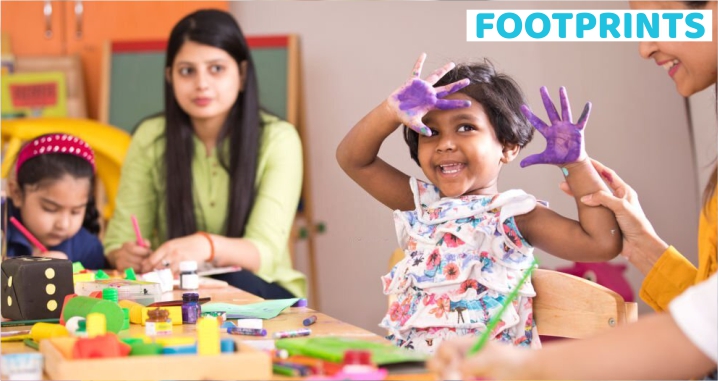Understanding the Curriculum and Goals of Preschool Education
 Nishant Saini
Nishant Saini
Preschool education is an important foundation for children's future learning and development. It is the first formal educational experience for many children and sets the stage for their future academic success. Understanding the curriculum and goals of preschool education can help parents, educators, and policymakers make informed decisions about how to support children's early learning.
Meet the developmental needs of children
The curriculum in preschool education is designed to meet the developmental needs of young children. It focuses on building children's cognitive, social, emotional, and physical skills through a variety of activities and experiences. The curriculum is often divided into several areas of learning, including language and literacy, mathematics, science, social studies, and the arts.
Develop literacy skills
Language and literacy are an important focus of preschool education, as children are just beginning to develop their reading and writing skills. Preschool educators work to build children's vocabulary, phonological awareness, and print knowledge through activities such as storytime, letter and sound recognition, and writing activities.
Insights into important subjects
Mathematics is another important area of learning in preschool. Children are introduced to basic concepts such as counting, sorting, and matching through hands-on activities and games. This helps to build their understanding of mathematical concepts and helps them develop their problem-solving skills.
Science and social studies are also included in the curriculum of the playschool. Children learn about their environment and the world around them through activities such as nature walks, experiments, and discussions. They are also introduced to basic concepts such as time, weather, and the community.
Incorporating non-academic curriculum
The arts, including music, art, and drama, are also an important part of the preschool curriculum. These activities help children develop their creativity and self-expression and provide opportunities for them to learn about different cultures and traditions.
Encourage play-based learning
Another important aspect of preschool education is play-based learning. Play is a natural and effective way for young children to learn and explore their environment. Preschool educators use play to introduce
children to new concepts and ideas, while also allowing them to develop their creativity, curiosity, and problem-solving skills. Through play, children can learn about themselves, others, and the world around them. The best daycare promotes play-based learning that allows children to take the lead in their learning, which is essential for their autonomy and self-esteem.
Transition to formal schooling
Preschool education is also often focused on preparing children for the transition to formal schooling. For example, preschool teachers may focus on developing children's fine motor skills, such as holding a pencil or using scissors, so that they are better equipped to handle the demands of writing and other classroom activities. Teachers may also work on developing children's attention span, memory skills, and self-regulation so that they are better able to sit and focus in a classroom setting.
Be an umbrella for diversity
Preschool programs should be designed to meet the needs of children from diverse cultural, linguistic, and socioeconomic backgrounds. For example, bilingual or multilingual programs may be needed for children who speak languages other than English at home. Additionally, these programs in playschool should be designed to accommodate children with disabilities and special needs, including physical, cognitive, and emotional needs.
Goals of Preschool Education
The goals of preschool education are closely aligned with the curriculum. They are designed to support children's overall development and prepare them for future academic success. The main goals include:
1. Building children's cognitive skills: It helps children develop their memory, attention, and problem-solving skills through a variety of activities and experiences.
2. Promoting language and literacy development: It helps children develop their reading and writing skills and build their vocabulary.
3. Supporting children's social and emotional development: Preschool education helps children develop their social and emotional skills through activities such as group play and discussions.
4. Preparing children for future academic success: The goal of education in a daycare setting is to help children develop the skills and knowledge they need to be successful in school and life.
Final Words
Overall, preschool education plays a crucial role in children's development and sets the stage for their future academic success. A well-designed curriculum and clear goals can help ensure that children receive the support and opportunities they need to succeed. With 85 locations in 15 cities across India, Footprints, founded and managed by IIT and IIM alumni, is the premier preschool and daycare provider in the country. Live CCTV broadcasting is
built into the facility's infrastructure to keep children safe. Each child receives individualized care thanks to a staff-to-student ratio that consistently ranks among the best in the world. As a daycare, it also makes sure that healthy options like fruits are included in meals and that the facility is kept clean.
Subscribe to my newsletter
Read articles from Nishant Saini directly inside your inbox. Subscribe to the newsletter, and don't miss out.
Written by

Nishant Saini
Nishant Saini
Footprints Play School & Day Care Creche the choice of a pre school is preceded by a whole lot of research by parents. Whether it is proximity to the school or its teaching methodology, its curriculum design or focus on children safety, there is a lot for the parents to consider.